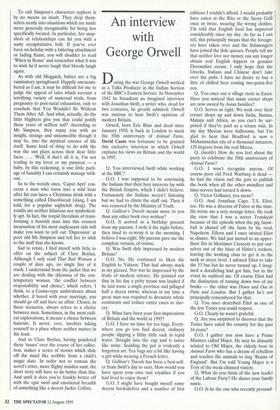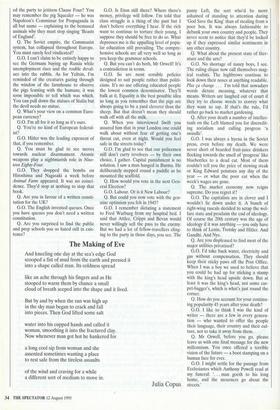An interview with George Orwell
During the war George Orwell worked as a Talks Producer in the Indian Section of the BBC's Eastern Service. In November 1942 he broadcast an imagined interview with Jonathan Swift, a writer who, dead for two centuries, he greatly admired. Orwell was anxious to hear Swift's opinions of modern Britain.
Orwell, born Eric Blair and dead since January 1950, is back in London to mark the 50th anniversary of Animal Farm. David Caute was fortunate to be granted this exclusive interview in which Orwell explains his views on Britain and the world in 1995.
Q. You interviewed Swift while working at the BBC?
G.O. I was supposed to be convincing the Indians that their best interests lay with the British Empire, which I didn't believe. Fortunately the Indians weren't listening but we had to churn the stuff out. Then it was censored by the Ministry of Truth.
Q. Gulliver's Travels meant more to you than any other book ever written?
G.O. It arrived as a birthday present from my parents. I stole it the night before, then tried to re-wrap it in the morning. I believe I was eight. My parents gave me the complete version, of course.
Q. Was Swift duly impressed by modern Britain?
G.O. No. He continued to liken the English to Yahoos. That had always stuck in my gizzard. Nor was he impressed by the fruits of modern science. He pointed out that in his day a petty tyrant was lauded if he laid waste a single province and pillaged half a dozen towns, whereas in my time a great man was required to devastate whole continents and reduce entire races to slav- ery.
Q. What have been your first impressions of Britain and the world in 1995?
G.O. I have no time for tea bags. Every- where you go you find decent, ordinary people dipping a filthy little sack in tepid water. Straight into the cup and it tastes like urine. Scalding the pot is evidently a forgotten art. Tea bags are a bit like having a girl while wearing a French letter.
Q. Gulliver's Ravels has been a best-sell- er from Swift's day to ours. How would you have spent your own vast royalties if you had lived to enjoy them?
G.O. I might have bought myself some decent bookshelves and a number of first editions I couldn't afford. I would probably have eaten at the Ritz or the Savoy Grill once or twice, wearing the wrong clothes. I'm told that English food has improved considerably since my day. As far as I can tell, this principally means that the foreign- ers have taken over and the fishmongers have joined the dole queues. People tell me that neither love nor money can any longer obtain real English kippers or genuine Devonshire cream. I only hope that the Greeks, Italians and Chinese don't take over the pubs. I have no desire to buy a litre of chilled beer costing two-point-five ecu.
Q. You once ran a village store in Essex. Have you noticed that many corner shops are now owned by Asian families?
G.O. Serves us right. We took over their corner shops up and down India, Burma, Malaya and Africa, so you can't be sur- prised if they've paid us a return visit. In my day Meccas were ballrooms, but I'm glad to hear that Bradford is now a Mohammedan city of a thousand minarets, 129 degrees from the real Mecca.
Q. (hastily) How do you feel about the party to celebrate the 50th anniversary of Animal Farm?
G.O. I won't recognise anyone. Of course poor old Fred Warburg is dead - he had the vision and the guts to publish the book when all the other swindlers and time-servers had turned it down.
Q. Victor Gollancz, you mean?
G.O. And Jonathan Cape. T.S. Eliot, too. He was a director of Faber at the time.
He wrote me a very strange letter. He took the view that I was a secret Trotskyist because of the episode when the pig Snow- ball is chased off the farm by his rival, Napoleon. Eileen and I once invited Eliot to dinner. We had just moved to an upper- floor flat in Mortimer Crescent to put our- selves out of the blast of Hitler's rockets, leaving the working class to get it in the neck at street level. I advised Eliot to take the 53 bus but he never turned up. I imag- ined a doodlebug had got him, but in the event he outlived me. Of course Eliot had the distinction of turning down two of my books — the other was Down and Out in Paris and London. But I gather he's not principally remembered for that.
Q. You once described Eliot as one of the few Tories you could respect.
G.O. Clearly he wasn't grateful.
Q. Are you surprised to discover that the Tories have ruled the country for the past 16 years?
G.O. I gather you now have a Prime Minister called Major. He may be distantly related to Old Major, the elderly boar in Animal Farm who has a dream of rebellion and teaches the animals to sing 'Beasts of England'. But I'm told Young Major is a Tory of the weak-chinned variety.
Q. What do you think of the new leader of the Labour Party? He shares your family name.
G.O. Is he the one who recently persuad- ed the party to jettison Clause Four? You may remember the pig Squealer — he was Napoleon's Commissar for Propaganda in all but name — explaining to the bemused animals why they must stop singing 'Beasts of England'.
Q. The Soviet empire, the Communist system, has collapsed throughout Europe. You must surely feel vindicated?
G.O. I can't claim to be entirely happy to see the Germans buying up Russia while unemployment rises and the rouble deval- ues into the rubble. As for Yeltsin, I'm reminded of the creatures gazing through the window of the farmhouse to observe the pigs feasting with the humans; it was soon impossible to tell which was which. You can pull down the statues of Stalin but the devil needs no statue.
Q. What's your view on a common Euro- pean currency?
G.O. I'm all for it so long as it's ours.
Q. You're no kind of European federal- ist?
G.O. Hitler was the leading exponent of that, if you remember.
Q. You must be glad to see moves towards nuclear disarmament. Atomic weapons play a nightmarish role in Nine- teen Eighty-Four.
G.O. They dropped the bombs on Hiroshima and Nagasaki a week before Animal Farm appeared. It was no coinci- dence. They'd stop at nothing to stop that book.
Q. Are you in favour of a written consti- tution for the UK?
G.O. The English invented queues. Once you have queues you don't need a written constitution.
Q. Are you surprised to find the public and prep schools you so hated still in exis- tence? G.O. Is Eton still there? Where there's money, privilege will follow. I'm told that class struggle is a thing of the past but I don't believe everything I hear. If the rich want to continue to torture their young, I suppose they should be free to do so. What depresses me is the appalling level of popu- lar education still prevailing. The compre- hensive schools are all very well so long as you keep the grammar schools.
Q. But you can't do both, Mr Orwell! It's a contradiction in terms.
G.O. So are most sensible policies designed to suit people rather than politi- cians. It's no use offering educated people the lowest common denominator. They'll balk at it. Equality is the best possible idea so long as you remember that the pigs are always going to be a yard cleverer than the sheep. But that doesn't mean they should walk off with all the milk.
Q. When you interviewed Swift you assured him that in your London one could walk about without fear of getting one's throat cut, even at night. Would you feel safe in the streets today?
G.O. I'm glad to see that our policemen still don't carry revolvers — by their own choice, I gather. Capital punishment is no solution. I saw a man hanged in Burma. He deliberately stepped round a puddle as he mounted the scaffold.
Q. How would you vote in the next Gen- eral Election?
G.O. Labour. Or is it New Labour?
Q. But could you now vote with the gen- uine optimism you felt in 1945?
G.O. I remember dictating a statement to Fred Warburg from my hospital bed. I said that Attlee, Cripps and Bevan would never willingly sell the pass to the enemy. But we had a lot of fellow-travellers cling- ing to the party in those days, you see. The pansy Left, the sort who'd be more ashamed of standing to attention during `God Save the King' than of stealing from a poor box. It was always fashionable to debunk your own country and people. They never seem to notice that they'd be locked up if they expressed similar sentiments in any other country.
Q. What about the present state of liter- ature and the arts?
G.O. No shortage of nancy boys, I see. The ruling clique now call themselves mag- ical realists. The highbrows continue to look down their noses at anything readable. Plus ca change . . . I'm told that nowadays words dictate meaning, whatever that means. Writers are laughed out of court if they try to choose words to convey what they want to say. If that's the rule, I'd rather go back to market gardening.
Q. After your death a number of intellec- tuals on the Left blamed you for discredit- ing socialism and calling progress 'a swindle'.
G.O. I was always a hyena in the Soviet press, even before my death. We were never short of bearded fruit-juice drinkers flocking towards the smell of 'progress' like bluebottles to a dead cat. Most of them couldn't tell you the price of stewing steak or King Edward potatoes any day of the year — or what the poor eat when the week's wages are gone.
Q. The market economy now reigns supreme. Do you regret it?
G.O. The capitalists are in clover and I wouldn't lie down under it. A bunch of right-wing rascals decided to scrap the wel- fare state and proclaim the end of ideology. Of course the 20th century was the age of ideology if it was anything — you only have to think of Lenin, Trotsky and Hitler. And Gandhi. And Nye.
Q. Are you displeased to find most of the major utilities privatised?
G.O. I'd take back water, electricity and gas without compensation. They should keep their sticky paws off the Post Office. When I was a boy we used to believe that you could be had up for sticking a stamp with the king's head upside down. But at least it was the king's head, not some car- pet-bagger's, which is what's just round the corner.
Q. How do you account for your continu- ing popularity 45 years after your death?
G.O. I like to think I was the kind of writer — there are a few in every genera- tion — who wanted to offer the people their language, their country and their cul- ture, not to take it away from them.
Q. Mr Orwell, before you go, please leave us with one final message for the new millennium. You once offered a terrible vision of the future — a boot stamping on a human face for ever.
G.O. I might settle for the passage from Ecclesiastes which Anthony Powell read at my funeral: `. . man goeth to his long home, and the mourners go about the streets.'



















































 Previous page
Previous page